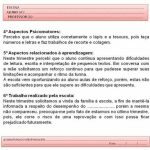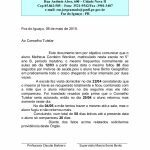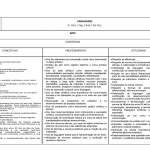
Below is a model of sentences to complete a report on early childhood education, prepared by the blog Espaço da Criança.
The (student's name) arrives at school happy and always with a story to tell, however, she has some periods when she gives a little charm to the entrance at first, but then she's fine. I realize that she feels safe in the school environment and likes to walk around the school a lot, offering to pick up modeling clay and perform small favors. She has an excellent relationship with the educator, colleagues and other school staff. He plays with everyone and enjoys being with the boys, as he prefers active games such as jumping, running, pushing boxes and tag, showing little interest in games of dolls.
She fulfills the teacher's requests and respects the rules and agreements of the room, drawing the attention of colleagues who do not. Affectionate, she hardly comes into friction with her colleagues, when that happens, she is firm in her decisions and uses dialogue as the main way to resolve conflicts.
His vocabulary is wide and he communicates clearly and objectively, making himself easily understood. She sometimes uses a rather loud voice to make her remarks, and has been encouraged to speak softly and unhurriedly.
She has good mathematical logic reasoning by classifying, serializing, ordering and quantifying with ease. She organizes collections based on their characteristics, noticing similarities and differences in their attributes such as color, shape, size and thickness.
Little by little, he is learning to give in and let his colleagues coordinate the game, sharing with him the moments of leadership. Despite my constant requests, conversations and arrangements, he insists on using physical force when solving conflicts, which many sometimes ends up causing friends to move away from him or even that he needs to be taken away so we can talk and with that, he becomes to calm down.
I'm worried about his low tolerance for frustration, because when he can't do something, he refuses to continue doing it, he mumbles and says he hates/hates school and that for him, he would never come again, doing it anyway or even crossing out the whole thing. work. In the same way, when upset, he gets agitated, swearing or reacts by hitting his colleagues.
His vocabulary is wide for his age group, being able to elaborate sentences and narrate stories, respecting the chronological sequence of facts. He remembers the combinations and stories we tell and relates them to his experiences outside the school environment. He is easy to rationalize and explain his feelings. In the conversation circle, he actively participates, always contributing to the topic discussed, sharing his knowledge with colleagues.
At the time of the conversation wheel or at the time of the story wheel, it is necessary to draw their attention so that they can participate more significant of these moments, because at this time he gets up, picks up a toy, draws the attention of his colleagues and appears restless. We suggest that the family take some time together to play with rules games and others that require attention and concentration, to help you in this aspect.
In graphic activities such as painting, he demonstrates pleasure in the movement of coming and going, making loose scribbles on the sheet. His drawings have not yet taken shape, being represented by floating tangles on the sheet. When using scissors, he chews the paper and needs help to complete this activity, which is still common in this age group.
He shows a taste for motor activities, his movements are agile and harmonious, shows good broad motor skills, jumping, running and jumping in a balanced way. In our graphic activities, he makes correct use of colored pencils and crayons, showing a good improvement in fine motor skills. Paint filling and respecting the space of the figure. He has been showing interest in the use of scissors, makes an effort to cut out and is already able to do without cutting the figure, highlighting only its outline.
It eats well and autonomously throughout the day. He accepts the foods offered, resists trying new flavors for a while, but accepts when we insist, even if he doesn't incorporate them into his taste buds.
|
PHRASES TO BE USED IN ANY KNOWLEDGE AREA OR AS OBS. AT THE END OF THE REPORT |
J The student shows interest in the proposed activities / J The student is participative and interested. J The student showed evolution in their learning process / the student advanced a lot in their learning process. L The student needs a lot of intervention in carrying out the activities / Needs encouragement at home to be able to advance in their learning process / Performs the activities, but requires constant intervention from the teacher / Needs help from the teacher and/or colleagues in carrying out the activities. L With more stimulation at home and being present to class regularly, the child can make many advances in their learning. |
| L.O.E. |
J expresses himself well orally. J presents ease to communicate. J presents clarity in his oral communication. J participates in the conversation circles, expressing himself very well. L is participative, likes to talk, but sometimes it is not understood, then change some letters Your communication is not clear, but you will be able to make progress due to the follow-up you have been doing with the SME speech therapist. J enjoy hearing stories. J recognize the letters of the alphabet J already presented a certain advance, if you have more incentive at home you can expand your knowledge. J recognizes the name. J write your own name with support. J write the name without support. L in writing the name, he needs the teacher's intervention to show him each letter. |
| MATH |
J count up to the number … J performs count term by term J recognizes some numerals J write the numbers until… J understands the concepts: inside/outside; top/bottom/between/forward/backward/side J the student will be able to advance if he is encouraged to do object counting at home. |
| VISUAL ARTS |
J has a taste for drawing; likes to paint, cut, paste. J know the colors / know some colors J enjoy the images of works of art presented by the teacher. J he respects his own productions and those of his colleagues. |
| SONG |
J enjoy listening to music. J like to sing. J moves the body, following the rhythm. J participates in the proposed activities. L most of the time they prefer to just listen and watch the class. |
| MOVEMENT |
J likes to participate in the games. J has balance and good motor coordination J likes group games. J is interested in playing with balls, ropes, toys, in the park. J respect the rules in games and games. L prefer to play alone L prefer to just watch the class |
| NATURE AND SOCIETY |
J participates in the proposed activities. J asks questions about the subject studied. J answer the proposed questions without difficulty L prefers to listen to colleagues and the teacher and observe the class, without expressing their opinions. |
| PERSONAL AND SOCIAL TRAINING |
J interacts well with colleagues / socializes with the group L at first she cried, called for her mother, but little by little she adapted. L before, he was quiet in his corner, but little by little he began to interact with the group, showing advances in his relationship with the group. J respect the rules L it needs constant teacher intervention in relation to the rules. J is autonomous in personal hygiene activities L it still needs the help and intervention of the teacher to carry out the hygiene activities. J takes care of their own matters L need help with the organization and care of the materials. |
|
CLOSING THE REPORT |
L Parents, encourage your child at home so that he/she can advance in his/her learning process. J Parents, keep encouraging your (a) child (a) so that (a) can progress more and more! |
Did you like it? Share this post on your social network
 SPECIAL STUDENT INDIVIDUAL REPORT
SPECIAL STUDENT INDIVIDUAL REPORT
 Individual Student Report with Special Needs
Individual Student Report with Special Needs
 INDIVIDUAL REPORT - ASSESSMENT IN EARLY CHILDHOOD EDUCATION
INDIVIDUAL REPORT - ASSESSMENT IN EARLY CHILDHOOD EDUCATION
 Undisciplined Student Report to the Guardianship Council
Undisciplined Student Report to the Guardianship Council
 Individual Report Template for Early Childhood Education
Individual Report Template for Early Childhood Education
 6TH TO 9TH YEAR ARTS CLASS PLAN
6TH TO 9TH YEAR ARTS CLASS PLAN
This site uses Akismet to reduce spam. Learn how your comment data is processed.

